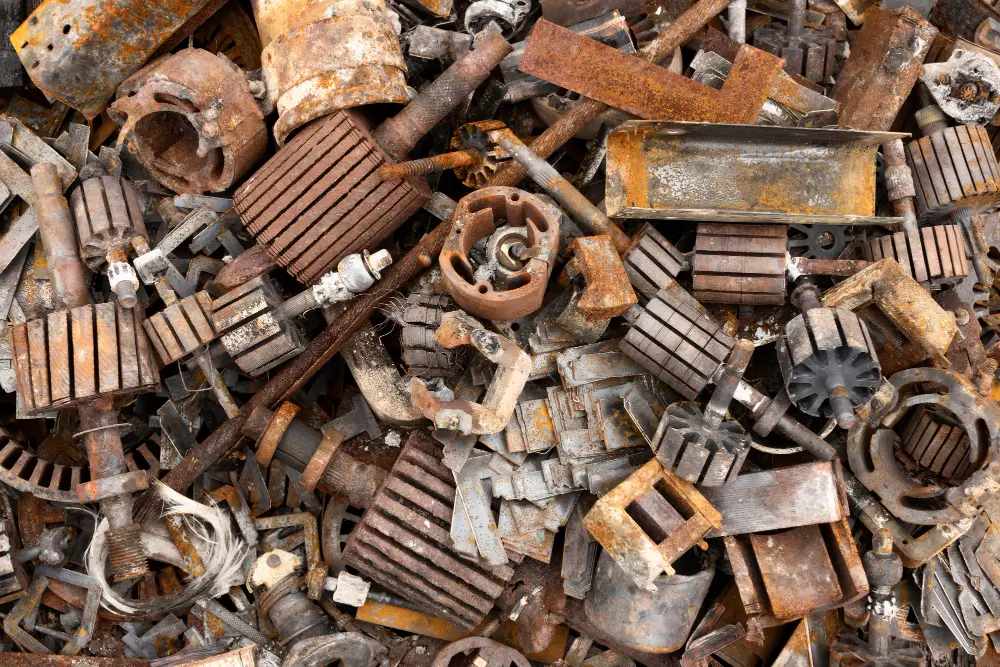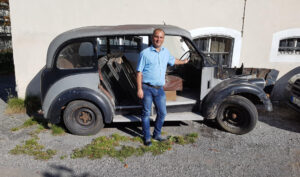That old car sitting in your driveway isn’t just taking up valuable space. It’s a goldmine of recyclable materials waiting to make a positive environmental impact. Many Cary residents don’t realize that the average vehicle contains thousands of pounds of recyclable materials that could be repurposed instead of slowly leaking harmful fluids into our local soil and water systems. Proper vehicle recycling represents one of the most comprehensive recycling efforts possible, with up to 95% of most vehicles capable of being recycled or repurposed in some way.
At Agile Towing Company Cary, our wrecker service helps connect local residents with environmentally responsible recycling facilities that ensure your vehicle’s materials are properly handled. Rather than letting that old car deteriorate and potentially harm our beautiful North Carolina environment, you can be part of the solution. Give us a call at (919) 276-5900 to learn how we can help transport your vehicle to appropriate recycling facilities.
In this article, we’ll explore exactly how vehicle recycling works, the environmental hazards it prevents, the resources it conserves, and how it contributes to Cary’s broader sustainability goals. Let’s dive into why your decision to recycle that old vehicle matters more than you might think.
Understanding Vehicle Recycling Basics
What happens when your car makes its final journey to a recycling facility? Vehicle recycling goes far beyond simply crushing cars into metal cubes, though that’s certainly one visible part of the process. The journey begins when a vehicle is transported to a recycling facility, where it undergoes a systematic dismantling process designed to maximize the recovery of usable materials.
The Vehicle Recycling Process
The average car contains more than 30,000 parts, and modern vehicle recycling operations work to salvage and repurpose as many of these components as possible. First, all fluids are carefully drained and captured for proper disposal or recycling. Next, valuable and reusable parts are removed for resale. Only then does the remaining shell get crushed and prepared for metal recycling.
Common Misconceptions About Vehicle Recycling
One common misconception is that only newer vehicles are worth recycling. The truth is that even the oldest, most deteriorated vehicles contain valuable metals and materials that can and should be recaptured. Even cars manufactured decades ago contain hundreds of pounds of steel, aluminum, copper, and other metals that can be melted down and reused with significant environmental benefits compared to mining new materials.
In recent years, the vehicle recycling industry has evolved dramatically, with advanced technologies allowing for more efficient material separation and recovery than ever before. What once might have ended up in a landfill can now be processed into raw materials for new products.
Preventing Hazardous Material Contamination Through Vehicle Recycling
Did you know that a single vehicle contains numerous fluids and materials that qualify as hazardous waste? When cars sit abandoned or are improperly disposed of, these substances can leak into the ground and eventually make their way into Cary’s waterways, potentially affecting our drinking water and harming local wildlife.
Harmful Materials in Your Vehicle
The list of potentially harmful materials in vehicles includes:
- Engine oil (typically 4-6 quarts per vehicle) which can contaminate up to 1 million gallons of fresh water if improperly disposed
- Transmission fluid containing heavy metals that can persist in soil for years
- Brake fluid which is both toxic and corrosive
- Antifreeze/coolant which contains ethylene glycol, a compound lethal to pets and wildlife even in small amounts
- Air conditioning refrigerant that can damage the ozone layer if released
- Lead and acid from batteries which can cause serious soil and water contamination
- Mercury from switches and other components that can cause neurological damage in humans and wildlife
Professional Handling and Local Regulations
Professional vehicle recycling facilities are equipped with specialized containment systems and trained staff who know how to safely capture and dispose of or recycle these hazardous materials. North Carolina’s Department of Environmental Quality maintains strict regulations around vehicle fluid disposal, requiring certified handling procedures that backyard operations simply can’t match.
The Town of Cary works hard to protect its watershed, and proper vehicle recycling plays an important role in those efforts. By choosing to recycle your vehicle through proper channels, you’re directly contributing to keeping these harmful substances out of our local environment.
Resource Conservation Through Parts Recycling
The environmental benefits of vehicle recycling extend far beyond preventing contamination. Every part that can be reused represents significant resource savings. Consider this: manufacturing a single new car part requires raw materials, energy for processing, water, and creates emissions. When we reuse existing parts, we eliminate most of that environmental footprint.
Valuable Components Given Second Life
Some of the most commonly recycled vehicle components include:
- Engines and transmissions which can be rebuilt and reinstalled in other vehicles
- Doors, bumpers, and body panels that can repair damaged vehicles
- Electronics and control modules that often remain functional long after a vehicle is retired
- Catalytic converters containing precious metals including platinum, palladium, and rhodium
- Glass that can be melted down for new products
- Tires that can be retreaded or processed into rubber products and fuel
Local Economic Benefits of Parts Recycling
In the Cary area, numerous repair shops rely on these recycled parts to keep repair costs affordable for their customers. A network of parts resellers connects vehicle recycling facilities with mechanics and DIY enthusiasts looking for quality components at reduced prices. This creates a virtuous cycle where proper recycling leads to economic benefits while reducing environmental impact.
The energy savings are substantial too. Recycling aluminum, for example, uses approximately 95% less energy than producing new aluminum from raw bauxite ore. With the average vehicle containing about 300 pounds of aluminum, that represents significant energy conservation.
Metal Recycling and Its Environmental Impact
The sheer volume of metal recovered through vehicle recycling makes this process one of the most important sources of recycled materials in North America. Each year, vehicle recycling operations in the U.S. recover enough steel to produce nearly 13 million new vehicles.
How Vehicle Metals Are Recycled
When you recycle your vehicle, here’s what happens to the major metals it contains:
- Steel (approximately 2,400 pounds in an average car) is shredded, separated by magnets, and melted down to produce new steel products
- Aluminum components are separated and processed into new aluminum stock for manufacturing
- Copper from wiring and components is recycled into new electrical components
- Precious metals from catalytic converters and electronics are carefully extracted and refined
Environmental Savings From Metal Recycling
The environmental impact of recycling these metals rather than mining new materials is profound. Recycling steel, for instance, reduces air pollution by 86%, water pollution by 76%, and water usage by 40% compared to producing new steel. It also eliminates the destructive land impacts of mining operations.
Cary’s proximity to major transportation networks makes it an efficient location for connecting end-of-life vehicles with large-scale metal recycling operations throughout the Southeast. This regional efficiency further reduces the carbon footprint of the recycling process.
Contributing to Cary’s Sustainability Efforts
How does your decision to recycle a vehicle align with broader community goals? Cary has established itself as a leader in municipal sustainability, with ambitious goals for reducing waste and protecting natural resources. Vehicle recycling supports these initiatives by diverting thousands of pounds of material from landfills with each car processed.
Alignment With Local Environmental Initiatives
The Town of Cary’s comprehensive waste reduction strategy benefits when residents choose proper vehicle recycling. Every vehicle properly recycled represents cubic yards of landfill space saved and potential contamination avoided. With landfill space becoming increasingly limited and expensive, this represents both environmental and economic benefits for the community.
Reducing Carbon Footprint Through Vehicle Recycling
Local sustainability initiatives also focus on reducing carbon emissions, and vehicle recycling contributes here too. The energy saved through recycling metals and reusing parts translates directly to reduced carbon emissions compared to manufacturing new components.
As vehicle technology continues to evolve, especially with the growth of electric vehicles, recycling processes are adapting as well. New techniques for safely handling and recycling lithium-ion batteries and other advanced components ensure that even these next-generation vehicles will be processed responsibly at end-of-life.
At Agile Towing Company Cary, we’re proud to facilitate this environmental protection by connecting vehicle owners with appropriate recycling facilities. Our wrecker service ensures vehicles are transported safely and efficiently to the right destination.
The Environmental Choice for Your End-of-Life Vehicle
When your vehicle reaches the end of its life, recycling it properly prevents contamination, conserves resources, and supports Cary’s sustainability goals. Whether you’re looking to sell your junk car for cash or simply remove an eyesore from your property, contact Agile Towing Company Cary at (919) 276-5900 to transport your vehicle to appropriate recycling facilities.
Your choice makes a real difference. Each recycled vehicle keeps materials out of landfills, safely processes hazardous fluids, and saves energy. Plus, you might earn some money in the process. Give your old car a final purpose that benefits both your wallet and our environment.



